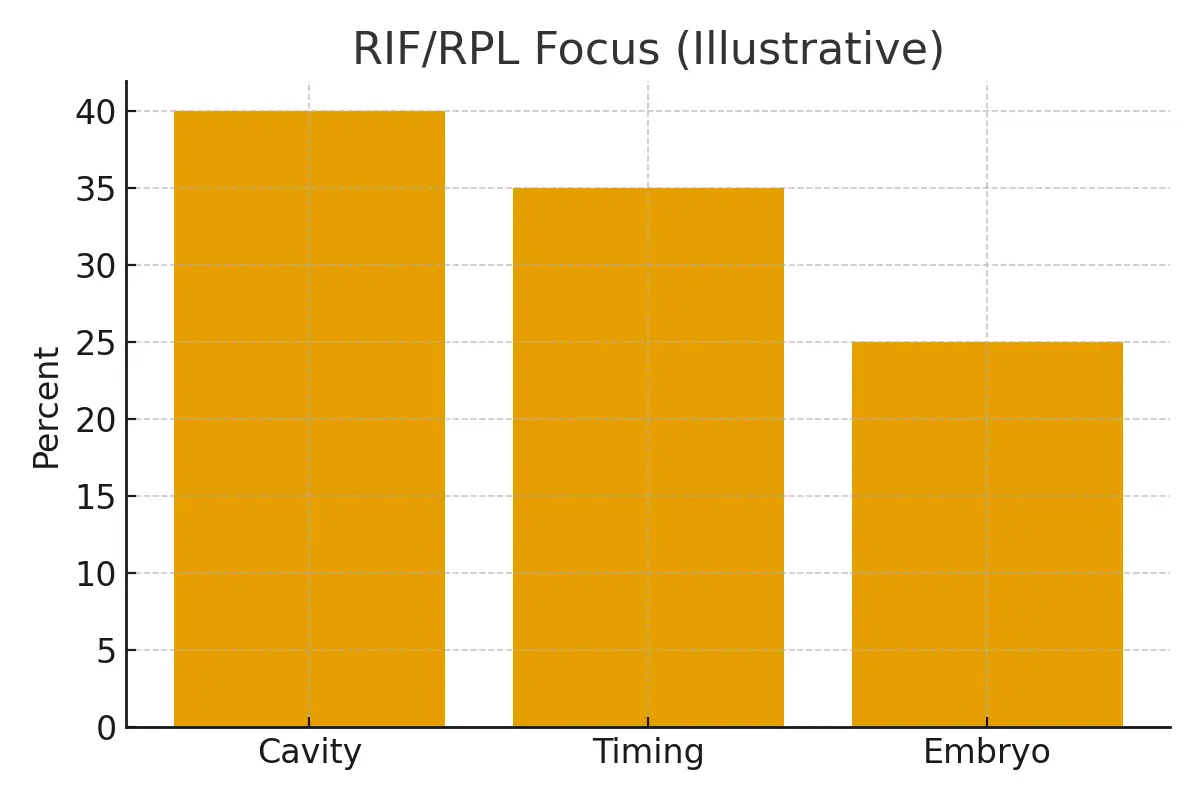
This article explains progesterone timing and its role in the Uterine & Implantation (RIF/RPL) pathway. It focuses on the checks and adjustments that directly influence outcomes, budgets, and timelines—so you can move forward with confidence.
What It Is
Progesterone is the hormone that prepares the uterine lining to receive an embryo. In plain English: if progesterone starts too early or too late, the lining and embryo can fall “out of sync,” lowering implantation odds. Checking and adjusting timing before transfer can improve results.
Who It Helps
This pathway matters for:
- Patients with recurrent implantation failure (RIF) or recurrent pregnancy loss (RPL)
- Women using frozen embryo transfers (FET), where timing is tightly controlled
- Patients with irregular luteal phases or hormone fluctuations
- Those whose lab results show unusual progesterone rise patterns
Step-by-Step
A clear sequence with checkpoints:
- Baseline labs — confirm hormone levels before progesterone start.
- Progesterone start — typically after estrogen preparation, on a set calendar day.
- Mid-course checks — blood test to confirm absorption and correct levels.
- Adjustments — adjust dose, route, or timing if out of range.
- Embryo transfer — scheduled to match endometrial receptivity.
Pros & Cons
Pros:
- Higher implantation rates when embryo and lining are synchronized
- Simple blood tests confirm correct timing
- Flexible options: oral, vaginal, or injectable progesterone
Cons:
- Requires precise clinic coordination
- Lab monitoring may add cost and stress
- Over-adjustment can cause confusion or delays
Costs & Logistics
- Line items: lab draws, progesterone medications, extra monitoring
- Insurance: often covers meds but not always repeated labs
- Cash flow: pharmacy fulfillment timing is critical; delays can disrupt cycles
- Tracking: align clinic calendar, pharmacy windows, and lab hours to avoid last-minute issues
What Improves Outcomes
- Checking blood levels 1–2 days after starting progesterone
- Adjusting dose or timing based on absorption and metabolism
- Using clinic-approved pharmacies to avoid shipment delays
- Avoiding unnecessary changes once levels are in the optimal range
Case Study
A 37-year-old with 2 failed frozen transfers had her progesterone checked before her third attempt. Results showed levels were too low despite standard dosing. After switching to injectable progesterone and rechecking levels, her transfer aligned correctly—and resulted in a successful pregnancy. The difference came from timing and dose adjustments.
Mistakes to Avoid
- Skipping progesterone level checks before transfer
- Starting progesterone too early or too late relative to embryo age
- Overlooking pharmacy delays that disrupt dosing schedules
- Assuming “one-size-fits-all” dosing works for every patient
FAQs
Q. Why does progesterone timing matter in IVF?
Ans : Because the uterus only stays “receptive” for a short window. If progesterone and embryo development are not synchronized, implantation odds drop.
Q. How are progesterone levels checked?
Ans : Through blood tests taken after starting progesterone, usually 1–2 days in, to ensure levels are in the optimal range.
Q. What happens if levels are too low?
Ans : Your doctor may increase the dose, switch delivery method (e.g., from vaginal to injectable), or adjust timing before transfer.
Q. Do frozen embryo transfers (FET) always require progesterone timing checks?
Ans : Not always, but they are strongly recommended for patients with prior failed transfers, hormone variability, or unexplained implantation issues.
Q. Can pharmacy delays affect progesterone timing?
Ans : Yes. Late delivery of medications can push back transfer or cause mistimed starts, which is why advance planning is critical.
Next Steps
- Free 15-min nurse consult
- Upload labs for review
- Personalized cost breakdown for your cycle
Related Links

Dr. Kulsoom Baloch
Dr. Kulsoom Baloch is a dedicated donor coordinator at Egg Donors, leveraging her extensive background in medicine and public health. She holds an MBBS from Ziauddin University, Pakistan, and an MPH from Hofstra University, New York. With three years of clinical experience at prominent hospitals in Karachi, Pakistan, Dr. Baloch has honed her skills in patient care and medical research.





